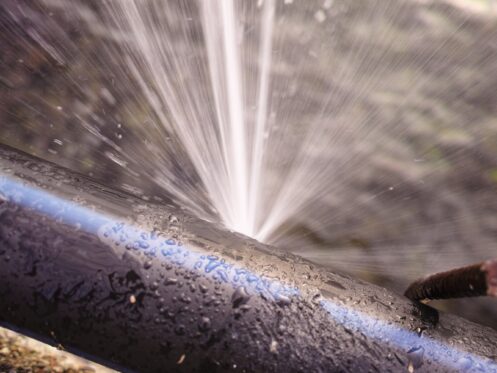As spring arrives, businesses and residents of Cheshire, CT enjoy warming temperatures and renewed spirits. However, spring can also mean new plumbing problems. Since your plumbing system works hard during the winter, issues can arise and become noticeable as the temperature increases.
When you identify and fix plumbing problems early, you can minimize expensive repairs and avoid substantial property damage. Here are five common springtime plumbing issues to watch for and some steps you can take to prevent or address them.
1. Leaky Pipes
During the winter months, you likely worry about freezing and bursting pipes. While you might think that the arrival of spring means no longer worrying about pipe bursts, spring thaws can uncover hidden issues. Pipe cracks caused by unprotected pipes expanding and bursting in the winter might first become noticeable during the spring.
Some signs that you might have leaky pipes include:
- Spikes in water bills without a corresponding increase in water use
- Bad or musty odors
- Wetness or dampness around the pipes
- Water on the bathroom floor around the tub or toilet
- Water pooled around outdoor faucets
- Water leaking from the water lines under your deck
How to Prevent Leaky Pipes
To prevent leaky pipes caused by freezing, you need to do several things. Have a plumber insulate all exposed pipes in your basement, crawlspace, attic, garage, or other area where they’re exposed with fiberglass insulation or foam sleeves. When there’s a freeze warning, drip water from your sink and bathtub faucets at a slow trickle. Open the cabinet doors beneath your sinks, and keep your heat turned on.
Outdoors, cover your hose bibs and outdoor faucets during the winter. Drain all water from your hoses and store them away. Turn off the water valves to your outdoor spigots.
What to Do About Leaky Pipes in the Spring
If you think you have a leaky pipe, it’s already too late to prevent it. The solution for a leaky pipe is to get it fixed as fast as possible. Our professional plumbers at F.F. Hitchcock Plumbing, Heating & Cooling in Cheshire can respond quickly. We’ll find and fix the leak and help prevent property damage from occurring.
2. Clogged Pipes and/or Slow Drains
People spend more time indoors and place a heavy burden on their homes’ plumbing systems when it’s cold outside. Cooking, cleaning, and showering all require additional plumbing use that can strain plumbing infrastructure. At the same time, leaves and other debris can build up and clog outdoor drains.
How to Prevent Clogged Pipes and Slow Drains
You can take several steps to keep your pipes and drains clear and clog-free year-round, including:
- Not pouring hot grease down sinks
- Installing drain strainers in showers and sinks
- Not using the garbage disposal for fats
- Regularly flushing drains with hot water
- Pouring a vinegar and baking soda mixture in drains
- Scheduling regular preventative maintenance
What to Do About Clogged Pipes or Slow Drains
If you think you have a minor clog in your toilet or bathtub drain, try using a plunger. However, you’ll need to call a plumber at F.F. Hitchcock Plumbing, Heating & Cooling to deal with persistent clogs or slow drains. Avoid pouring chemical drain cleaners in toilets or drains, as these can deteriorate your pipes.
3. Tree Root Intrusions
When trees grow, their roots can invade your underground plumbing pipes through joints, small cracks, and other weak areas. Tree root intrusions can wreak havoc on your sewer pipes, sprinkler system, and water meter and lead to expensive pipe repairs.
You can’t see this type of damage, but you can identify some signs that something might be wrong. For example, you might experience a drop in water pressure, pooled water in your lawn, or slow drains.
How to Prevent Tree Root Intrusions
Preventing tree root intrusions begins with taking care when planting trees. You need to make sure they’re placed at least 10 to 20 feet away from your sewer lines. You should also consider tree species with less extensive tree root systems.
You can have a plumber install tree root barriers around your sewer pipes to keep roots away. If your pipes are older and made out of clay, you might want to consider replacing them with root-resistant pipes made from PVC. Finally, calling a local plumbing services team for regular inspections can help to identify tree root intrusions early before they cause extensive damage.
What to Do About Tree Root Intrusions
If you think something is wrong with your underground pipes, it’s time to call our plumbers at F.F. Hitchcock Plumbing, Heating & Cooling. We’ll inspect your sewer pipes and can perform hydro jetting to blast away existing roots and prevent future blockages.
4. Gutter and Outdoor Drain Clogs
Blooming plants and trees and higher winds lead to debris accumulation in gutters and outdoor drains. This increased debris can clog your storm drains and gutters and prevent them from draining properly. If you don’t take care of this problem, it can cause water to accumulate around your foundation and cause damage.
How to Prevent Gutter and Outdoor Drain Clogs
To prevent your storm drains and gutters from becoming clogged, you’ll need to regularly clean them. Remove leaves and debris from your gutters, downspouts, and storm drains. Flush your downspouts with a hose to rid them of debris.
What to Do About Clogged Gutters and Storm Drains
If your gutters and storm drains are clogged, you can try to remove the debris. You might want to consider hiring a professional to install gutter guards and snake out your storm drains to remove stubborn blockages.
5. Water Heater Problems
Your family places heavy demands on your water heater during the winter for cooking, cleaning, and bathing. Its components can wear out with heavy use and lead to problems. Sediment can also build up and reduce your water heater’s efficiency.
How to Prevent Water Heater Problems in the Spring
The best way to prevent water heater problems during the spring is to schedule annual maintenance. A plumber can inspect the unit’s components and flush it out to prevent problems from developing.
What to Do About Water Heater Problems
If you notice signs that your water heater isn’t working properly, you’ll want to contact a plumber. Some signs to watch for include:
- Banging noises
- Inconsistent water temperatures
- Energy bill spikes
- Lack of hot water
Your plumber can identify the issue, flush out your water heater, and replace worn components. If your water heater is older, you might want to think about replacing it.
Talk to Our Plumbing Experts
Spring plumbing problems can damage your home’s plumbing infrastructure and lead to expensive plumbing repairs if they aren’t quickly addressed. Thankfully, you can take simple steps to prevent these common issues from occurring.
If you’ve noticed something not quite right with your plumbing, you should trust our plumbing professionals at F.F. Hitchcock Plumbing, Heating & Cooling in Cheshire. Our company has proudly served area residents and businesses since 1870. Our extensive range of plumbing services includes drain cleaning, pipe repair, fixture replacement, plumbing repair, maintenance, commercial plumbing services, and more.
Contact us at F.F. Hitchcock Plumbing, Heating & Cooling today for more information or to schedule an appointment.








